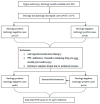Who Could Be Blamed in the Case of Discrepant Histology and Serology Results for Helicobacter pylori Detection?
- PMID: 35054298
- PMCID: PMC8774513
- DOI: 10.3390/diagnostics12010133
Who Could Be Blamed in the Case of Discrepant Histology and Serology Results for Helicobacter pylori Detection?
Abstract
Background: Discrepancies between histology and serology results for Helicobacter pylori detection could be caused by a variety of factors, including a biopsy sampling error, expertise of the pathologist, natural loss of infection due to advanced atrophy, or a false-positive serology in the case of a previous infection, since antibodies may be present in blood following recovery from the infection.
Aims: To identify true H. pylori-positive individuals in discrepant cases by serology and histology using real time polymerase chain reaction (RT-PCR) as a gold standard.
Methods: Study subjects with discrepant histology and serology results were selected from the GISTAR pilot study data base in Latvia. Subjects having received previous H. pylori eradication therapy or reporting use of proton pump inhibitors, antibacterial medications, or bismuth containing drugs one month prior to upper endoscopy were excluded. We compared the discrepant cases to the corresponding results of RT-PCR performed on gastric biopsies.
Results: In total, 97 individuals with discrepant results were identified: 81 subjects were serology-positive/histology-negative, while 16 were serology-negative/histology-positive. Among the serology-positive/histology-negative cases, 64/81 (79.0%) were false-positives by serology and, for the majority, inflammation was absent in all biopsies, while, in the serology-negative/histology-positive group, only 6.2% were proven false-positives by histology.
Conclusions: Among this high H. pylori prevalent, middle-aged population, the majority of discrepant cases between serology and histology were due to false positive-serology, rather than false-negative histology. This confirms the available evidence that the choice of treatment should not be based solely on the serological results, but also after excluding previous, self-reported eradication therapy.
Keywords: H. pylori; discrepant cases; histology; polymerase chain reaction; serology.
Conflict of interest statement
The authors declare no conflict of interest.
References
-
- Kokkola A., Rautelin H., Puolakkainen P., Sipponen P., Färkkilä M., Haapiainen R., Kosunen T.U. Positive result by serology indicates active Helicobacter pylori infection in patients with atrophic gastritis. J. Clin. Microbiol. 1998;36:1808–1810. doi: 10.1128/JCM.36.6.1808-1810.1998. - DOI - PMC - PubMed
-
- Miernyk K.M., Bruden D.L., Bruce M.G., McMahon B.J., Hennessy T.W., Peters H.V., Hurlburt D.A., Sacco F., Parkinson A.J. Dynamics of Helicobacter pylori-specific immunoglobulin G for 2 years after successful eradication of Helicobacter pylori infection in an American Indian and Alaska Native population. Clin. Vaccine Immunol. 2007;14:85–86. doi: 10.1128/CVI.00253-06. - DOI - PMC - PubMed
Grants and funding
LinkOut - more resources
Full Text Sources


